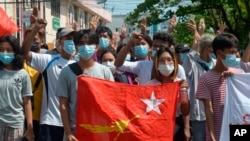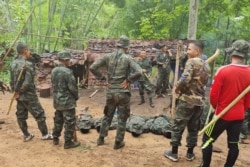The Myanmar junta’s equivocal reaction to a plan it agreed to with its regional neighbors for pulling the country back from the brink of collapse is raising doubts about the junta’s commitment to follow through anytime soon.
Since Myanmar’s military toppled the country’s elected civilian government February 1, the junta has shot and killed hundreds of mostly peaceful and unarmed protesters and sent thousands fleeing to neighboring India and Thailand seeking refuge. United Nations officials and envoys are warning of a pending humanitarian crisis and all-out civil war.
In a bid to keep the crisis from spiraling out of control, leaders of the 10-member Association of Southeast Asian Nations, which includes Myanmar, met in Jakarta, Indonesia, on April 24 with coup leader Min Aung Hlaing. A statement from the current chair of the bloc, Brunei, said the leaders reached a “five-point consensus” including a call for an immediate end to the violence and talks “among all parties concerned.”
In the days that followed, though, Myanmar’s junta issued statements of its own calling the points in the plan mere “suggestions,” which it would consider only when Myanmar “returns to stability” as its priority was to “maintain law and order.” The statements said the junta had also considered labeling a clandestine committee set up by the ousted lawmakers a terrorist organization under local laws. On Saturday, state-run TV reported that both the committee and the opposition National Unity Government had been declared terrorist groups.
“This is not what was in the spirit of what was agreed at Jakarta in the context of the five-point consensus. Senior General Min Aung Hlaing did not provide those kinds of qualifying comments when he agreed to the five-point consensus in Jakarta,” said Moe Thuzar, a fellow at Singapore’s Institute of Southeast Asian Studies who co-leads the group’s Myanmar studies program.
She warned that the remarks could portend a rocky road for the plan’s future.
“For the junta to make this kind of qualifier after the fact does not indicate that ASEAN’s follow-up to the five-point consensus agreement is going to be in that constructive manner that ASEAN was emphasizing,” Moe Thuzar said.
“It’s not an outright rejection, but clearly it shows that the junta wants to try to scope things their way,” she added. “It’s either showing its reluctance to commit or it’s trying to … set conditions.”
In addition to ending the violence and holding talks, Brunei said the leaders agreed that the bloc would provide humanitarian assistance and that Brunei would appoint a special envoy to facilitate the talks and to visit Myanmar to meet with “all parties concerned.”
The chair’s statement offers no timeframe or details on when or how to put the plan into action. Analysts say that gives Myanmar’s military, or Tatmadaw, plenty of room to decide how that happens.
“It’s exploiting the vagueness of the deal and the lack of agreed timeframe to its own advantage, as opposed to rejecting the deal outright. And it will try to sort of delay this as much as it can and ensure that in the meantime the Tatmadaw’s own kind of blueprint for how the country should run prevails,” said Hervé Lemahieu, Myanmar and Southeast Asia analyst at Australia’s Lowy Institute.
The Tatmadaw has justified the coup by claiming, without evidence, that the 2020 general elections that delivered the ruling National League for Democracy a second term were riddled with fraud. It has promised to hold new elections sometime after a one-year state of emergency, though many expect it to delay and to disqualify the widely popular NLD from running candidates.
One of the key questions the five-point plan leaves unanswered is the precise meaning of “all parties concerned.” Brunei’s statement sets no boundaries, leaving many to wonder whether it includes the NLD, any of the many ethnic minority-based parties and associated armed groups in the country, or the National Unity Government, which they have forged since the coup to challenge the junta.
“We don’t know, and that will also be up to the Tatmadaw largely to determine,” Lemahieu said. “The Tatmadaw really has control over the timing and then control over how you operationalize this plan.”
Many top NLD leaders, including Nobel laureate Aung Sang Suu Kyi, have remained in custody since their arrests on the morning of the coup, while others are in hiding to keep from joining them. Fighting between the Tatmadaw and some ethnic armed groups has also spiked.
“It’s not very clear who [are the] stakeholders in the statement. Without a clear definition and commitment from the regime, it will still be difficult to implement,” said Min Zaw Oo, who heads the Myanmar Institute for Peace and Security, a local think tank.
He said that at some point an ASEAN envoy may visit and humanitarian aid might arrive. Given what the junta has said and done since the meeting in Jakarta, though, he said he does not expect the Tatmadaw to let the five-point plan blow it far off the course it has already set for the country.
“I don’t think there will be any radical change different from the course the regime is steering in Myanmar, which is the new election and probably changes [for a] new electoral system,” he said. “The regime is forcing it through within one or two years, very likely two years, so I don’t think the ASEAN decision … will have a major impact on the regime’s major roadmap to where it is leading to.”







